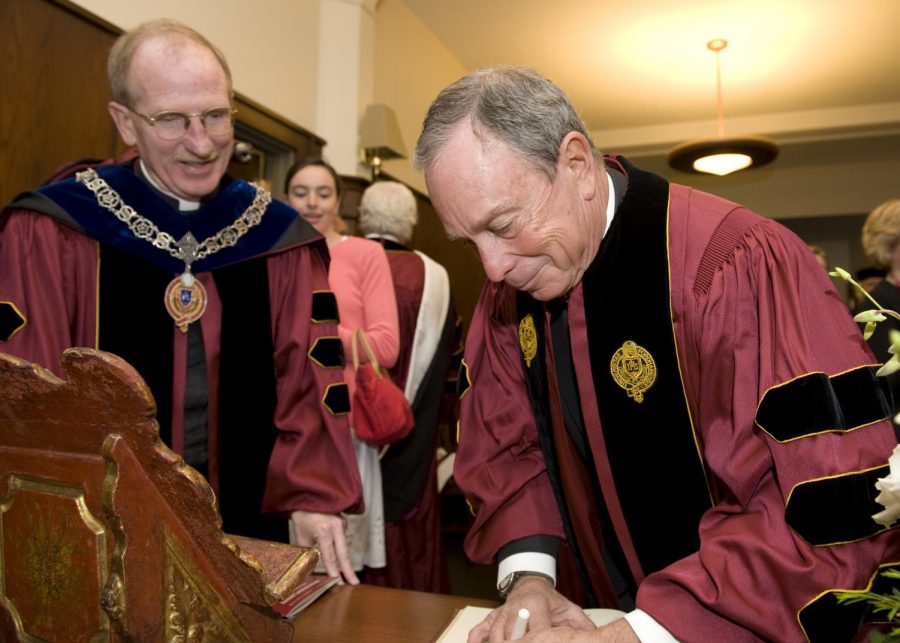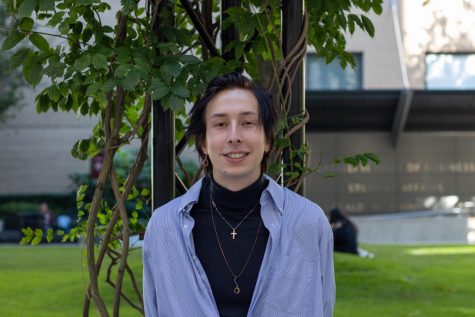Uncovering Fordham’s History With Bloomberg
CHRIS TAGGART/FORDHAM NEWS
The Rev. Father McShane, S.J., seen with Michael Bloomberg during the Class of 2009 Commencement. McShane reportedly had a conversation with California Representative Juan Vargas, highly praising Mr. Bloomberg when he was running for president.
March 10, 2020
After presidential candidates Joe Biden and Bernie Sanders dominated Super Tuesday, collectively winning over 1,100 delegates, former New York mayor Mike Bloomberg dropped out of the 2020 race.
Bloomberg emerged as a viable option for moderate voters who hesitated to support Biden, Minnesota Sen. Amy Klobuchar or former mayor Pete Buttigieg. In February, Bloomberg landed endorsements from New York Congressman Gregory Beeks and Georgia Congresswoman Lucy McBath.
Fordham University became associated with Bloomberg’s campaign when California congressman Juan Vargas told The Financial Times that he endorsed Bloomberg after having a conversation with Fordham University President Rev. Joseph M. McShane, S.J., on Feb. 21. Vargas said that McShane “praised the candidate’s integrity.”
“Father McShane and the university do not endorse nor comment upon candidates for political office, nor will the University comment on Father McShane’s private conversations,” Bob Howe, assistant vice president for communications and special adviser to the president, said.
Robin Andersen, a Fordham professor of communication and media studies, spoke with The Guardian about the unlikelihood of Bloomberg winning the democratic bid in February, prior to his forfeiting from the race.
Andersen said it is a problem when leaders of important and large constituencies make decisions on their own. “I absolutely think it is a problem for the university. The most fundamental aspect of a university is the faculty and students. Presidents of universities shouldn’t endorse a candidate especially without consulting a larger school community,” Andersen said.
According to Howe, McShane serves on the board of Bloomberg Philanthropies, a foundation with the intention to create change in public health, the environment, education, government innovation and the arts.
With a net worth of over $60 billion, speculations were made that Bloomberg was attempting to “buy the presidency,” spending more than $300 million on advertisements in one month alone. According to Howe, the Bloomberg Foundation donates to Fordham, contributing over $2,000,000 since 2015. In 2019 alone, the foundation donated $1,180,000. Howe said that the majority of the money is earmarked for financial aid.
Andersen called Bloomberg a “money man” because his campaign was not a grassroots movement: “He doesn’t talk about policies and his campaign comprises of staff, not volunteers.”
Alyssa Peralta, Fordham College at Lincoln Center ’23, worked as a canvasser on the Bloomberg campaign, along with two other Fordham students. Peralta said that they did it for the money: “It was a hustle. You get ten signatures per hour and then you get paid, it is not about whether you like him or not.”
According to Peralta, she worked through Meridian Strategies, a political firm run by mainly college students, including Justin Chae, a student at New York University. Canvassers were paid $18 per hour.
In total, Bloomberg spent over $650 billion on his campaign; in the aftermath of Super Tuesday, Bloomberg endorsed Biden on the belief that he can beat Trump in the fall.











